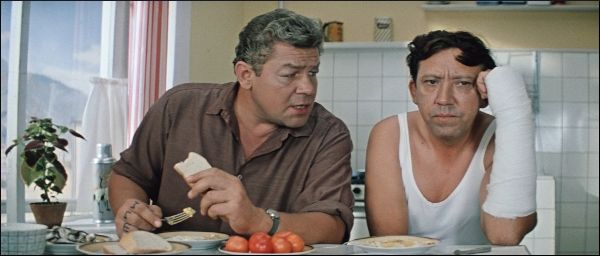Reaching almost 80 million viewers in the late 1960s, The Diamond Arm was part a series of eccentric comedies by the filmmaker Leonid Gaidai, a Soviet master of fast-paced comedies who made a number of wildly popular comedies in the 1960s and 1970s, many of them watched by over 50 million viewers.
In many ways, The Diamond Arm has a rather simple plot, partially based on a news item read by the scriptwriter, about a group of real-life Swiss smugglers who would hide diamonds and precious stones inside orthopedic plaster casts. In the film, the chief of a black market smuggling band, who wants to bring Turkish diamonds into the Soviet Union, sends his assistant to Istanbul on a cruise ship to act as a courier. On the way there, the courier meets an ordinary Soviet family man, named Semyon Semyonovich Gorbunkov, who, because of a mix up, ends up being confused for the courier in Turkey and has his arm placed in a plaster cast filled with diamonds.
"Leonid Gaidai was a Soviet master of fast-paced comedies who made a number of wildly popular comedies in the 1960s and 1970s, many of them watched by over 50 million viewers."
Gorbunkov immediately informs the Soviet militsiya (or police) of what happened, and the major part of the film is taken up with scenes in which the criminals attempt, in various ways, to lure Gorbunkov and retrieve the jewels. An increasingly incredulous and doubtful wife and a suspicious housing block supervisor, who is a typically narrow-minded and low-level bureaucrat, add a more domestic side to the plot and provide wonderful tangents targeting some of the more patent absurdities of Soviet life. The supervisor, known in the Soviet era as an "Upravdom," is played by Nonna Mordiukova, and she utters some particularly absurd one-liners that later became Russian catchphrases. In one scene, she responds to the saying that "A dog is a man's best friend" by asserting, "I don't know what it's like in the West, but here the upravdom is a man's best friend." The other main characters are militsiya officers, disguised as taxi drivers, and the rest of the smuggling band, including a member played by one of the Soviet Union’s few sex symbols, Svetlana Svetlichnaya. Among her lines, one of them has become yet another Russian catchphrase: “Не виноватая я, он сам пришёл!” (I am not guilty, he came of his own accord!), which she delivers after her attempt to seduce Gorbunkov is disrupted by his wife and the upravdom.

Like many Soviet films, the language is fairly standard throughout. Some of the gang members use a few slang terms, and the upravdom uses official Soviet slogans. There is also some language-related humor, such as when one of the criminals, to avoid entrapment by a local prostitute, utters the phrase, "Russo turisto – obliko morale," adding "o" to the end of Russian words to make them sound more southern European. One the crime boss's assistants, meanwhile, uses a rather bastardized and slangy Russian, as if playing a parvenu peasant who just arrived to the city. Elsewhere, at the beginning of the film, an invented language is spoken by those who fit the jewels: one speech curiously begins with a rather blasphemous imprecation in Italian, which then trails off into the imagined language.
The film also includes three major songs which later became famous. It has been suggested that the “Song About Rabbits” includes oblique references to marijuana (given its nonsense word for "grass"), while “The Island of Bad Luck” prefigures what the gangsters suffer throughout the film. The third tune is sung by Svetlichnaya and it’s a tango about passion. There are also two allusions to the 1967 James Bond film You Only Live Twice, which Soviet audiences would not have seen but which Gaidai may have.





